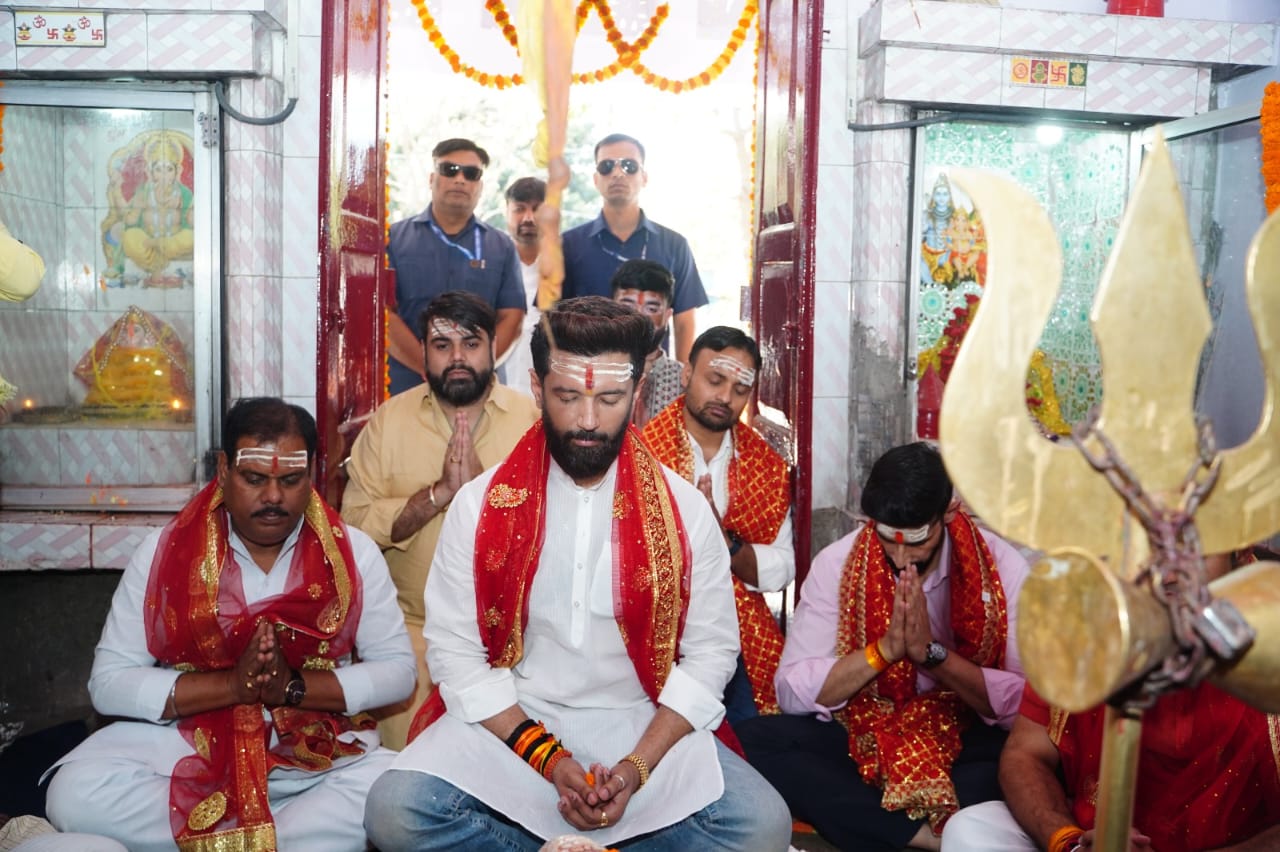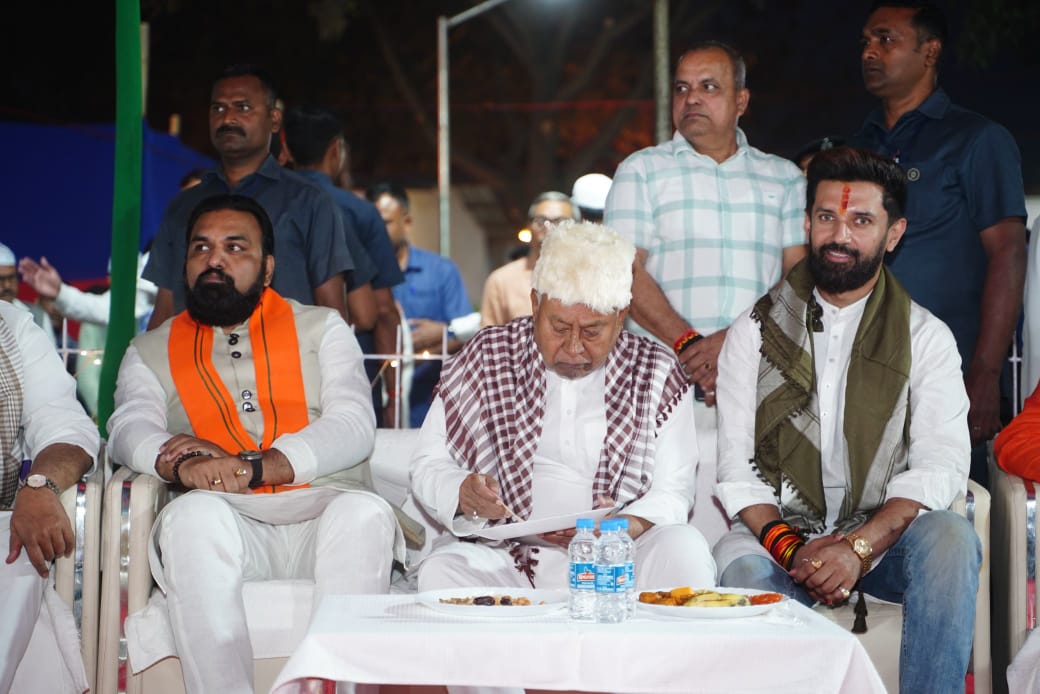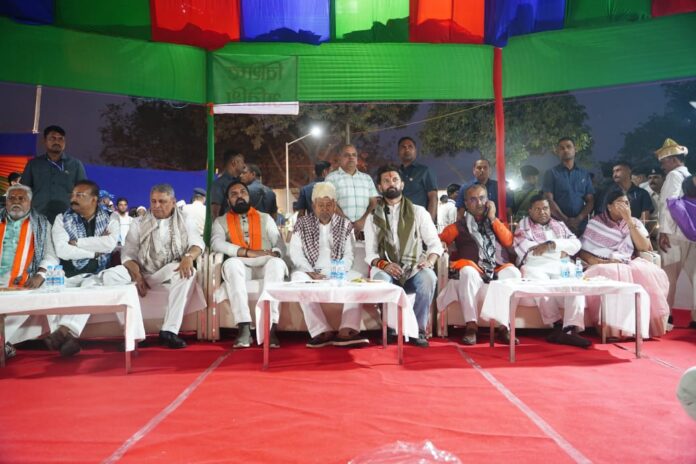Sami Ahmad, TwoCircles.net
Chirag Paswan, the son of the late Ram Vilas Paswan — a stalwart Dalit leader — and Reena Sharma, a non-Dalit, seems to be rapidly shedding his image as a representative of Dalit politics and emerging as a vocal proponent of Hindutva. His public declaration of allegiance to Prime Minister Narendra Modi — calling himself “Modi ji ka Hanuman” — is just one of many signs pointing to this ideological shift. His support for the controversial Waqf (Amendment) Bill, which is now an Act, further reinforces his alignment with Hindutva politics.
In contrast to his father, who once advocated for a Muslim chief minister in Bihar and resigned from the Union Cabinet in protest against the 2002 Gujarat riots, Chirag’s political trajectory appears firmly rooted in the ideology of the ruling Bharatiya Janata Party (BJP) and its allies.
During Ramadan, he hosted an iftar party, yet its symbolic significance was overshadowed by the absence of any Muslim leaders. Prominent Muslim organisations chose to boycott the event, which was, notably, attended by Bihar Chief Minister Nitish Kumar. While Kumar appeared in traditional attire, including a fur cap, Chirag opted for a Tilak on his forehead, foregoing the customary skull cap. Many recalled how Ram Vilas Paswan used to wear a cap on such occasions — a contrast that did not go unnoticed, as Chirag seemed to emulate the style of Narendra Modi and Uttar Pradesh Chief Minister Yogi Adityanath, both known for rejecting such symbolic gestures.
This departure is not limited to mere appearances. Chirag’s statements reflect a more profound ideological transformation.
In early March, Pandit Dhirendra Shastri, popularly known as Baba Bageshwar, openly advocated turning India into a Hindu Rashtra (Hindu nation) and Bihar into a Hindu Rajya (Hindu state). When asked for his views, Chirag not only defended Bageshwar but criticised the Opposition — especially the Lalu Prasad-led Rashtriya Janata Dal (RJD) — for tushtikaran (appeasement), a term heavily employed by BJP leaders to target Muslim minorities.

Chirag said, “When people of other religions speak about their religion, parties like the RJD remain silent because they indulge in appeasement. The truth is that a prominent political party, especially a group of political parties, has started treating secularism as if it means appeasing a particular religion.”
Though he advised political leaders to refrain from reacting to religious figures’ statements, Chirag himself did not hold back in his endorsement of Shastri’s views.
On another occasion, when BJP MLA Haribhushan Thakur Bachaul made a controversial statement suggesting Muslims should remain indoors on Fridays (Juma) if they dislike the use of colours during Holi, Chirag came to his defence. Rather than condemning the remarks, he criticised RJD leader Tejashwi Yadav for objecting to them. “Agar kisi ko takleef hai to woh apna aage-pichhe soche (If anyone is uncomfortable, they should deal with it themselves),” he said.
He even introduced the phrase “Dharmik asantulan” (religious imbalance), accusing the RJD of twisting Bachaul’s words to stir communal tensions.
The Lok Janshakti Party (Ram Vilas), now under Chirag’s leadership, has five MPs in the Lok Sabha — none of whom are Muslim. Chirag himself represents the SC-reserved Hajipur constituency and holds a ministerial portfolio in the Modi Cabinet. One of his MPs, Shambhavi Chaudhary, is married into the family of the late Hindutva leader Kunal Kishore.
Notably, Mahboob Ali Qaiser, a former Muslim MP from the party during Ram Vilas Paswan’s leadership, did not receive a ticket under Chirag’s leadership for the 2024 Lok Sabha elections — further highlighting the party’s shift.
Chirag’s focus on Dalit issues has noticeably waned in recent time. During Holi, a disturbing incident took place in Aurangabad, where a Dalit teenage girl was allegedly run over deliberately by a car owned by the son of a Chirag-led party’s leader. But there was no statement from the party chief to condemn the incident. In the same district, two other Dalits were killed, yet the party failed to voice any strong protest.
His unequivocal support for the Waqf (Amendment) Bill has also drawn sharp criticism from Muslim community leaders, who accuse him of bolstering the BJP’s Hindutva-driven agenda.

Professor Pushpendra, former dean at the Tata Institute of Social Sciences (TISS), speaking to TwoCircles.net, observed, “Chirag Paswan is dependent on Modi and the NDA (National Democratic Alliance, which ruling the Centre as well as Bihar) for his role in national politics — a ministerial post and parliamentary and assembly seats. Though he routinely invokes the Constitution and secularism, with state elections approaching and communal polarisation rising, he has opted to take a side. He is taken a calculated risk — alienating Muslims in hopes of consolidating Hindu votes under the NDA and Modi’s influence.”
Even within the extended Paswan family, there is dissent. Pashupati Kumar Paras, leader of the Rashtriya Lok Janshakti Party and Ram Vilas Paswan’s brother, publicly criticised Chirag’s support for the Waqf Bill, calling it a betrayal of his father’s values. “Chirag says that his father is like a god to him, but he has acted against his wishes,” said Paras. In response, Chirag accused the Opposition of creating confusion regarding the Bill.
Professor Pushpendra concluded, “Chirag’s transformation into a Hindutva leader is now visibly unfolding. His recent attacks on the RJD and the Congress for ‘appeasement politics’, his support for the Waqf Bill in Parliament and his endorsement of Dhirendra Shastri’s call for a Hindu Rashtra — all point to this shift.”

